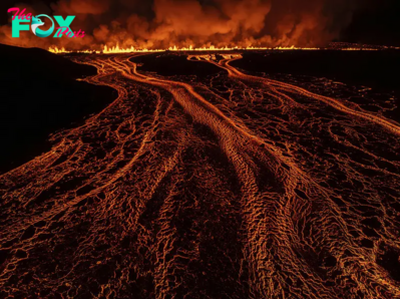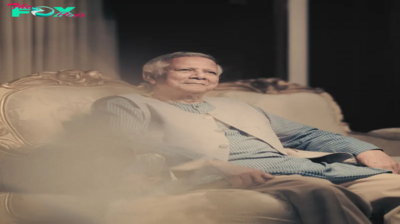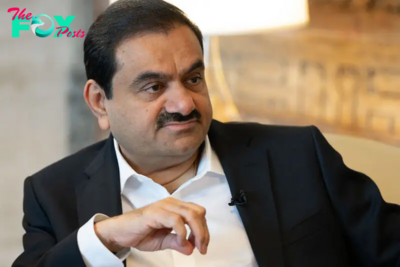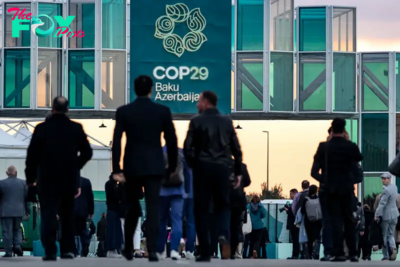World News
“Sweden is a Potential Target”: An Interview With NATO’s Newest Member
The table of NATO leaders looked a bit more crowded this week when they convened in Washington for their annual summit. It now included a seat for Sweden, the alliance’s newest member, which decided to join after Russia’s full-scale invasion of Ukraine shattered the illusion that Europe could forever remain at peace.
As the NATO summit wound down on July 11, Swedish Prime Minister Ulf Kristersson sat down with TIME to discuss the future of the alliance, the threats from Russia, and what it means to join the world’s most powerful Military club.
The following transcript of the conversation has been edited for length and clarity by TIME.
TIME: Before joining NATO, Sweden had a roughly 200-year tradition of neutrality and non-alignment. It remained neutral in World War I and World War II. Why was the risk to Sweden so severe in the spring of 2022 that you decided to break with that tradition and apply to join the NATO alliance?
Prime Minister Kristersson: There were two fundamental reasons behind our neutrality. During the Second World War it was pragmatic: Let’s try to stay out of this war and see whether it works or not. It obviously did. It’s a long philosophical discussion whether it was honorable or not to do that. But still.
After the war, the one top reason for not even discussing whether to join NATO was actually because of Finland. Finland was extremely pressurized from the Soviet Union, and in Sweden the general opinion was that it would be an unkind act toward Finland if Sweden also became a NATO member, going the same way as Norway and Denmark.
Slowly but surely, this turned into some kind of ideology: ‘We are neutral. We are not really the West.’ The Social Democratic Party made a big thing out of being neutral, and they stopped any discussion about changing it. People in the foreign office told me later that you couldn’t even discuss whether it would be a new pragmatic solution to become a member of NATO.
Did Sweden see any risks or costs to joining NATO last year?
One opinion was that we simply don’t need to do it. It all works well without NATO. The Swedish air force was [at one point] the fourth or fifth strongest. So we drew some strong conclusions from being non-aligned. Also I think quite a few people who were more pacifist-leaning said that NATO is a war organization: ‘We don’t want to fight other countries' wars.’ That kind of thing. But mainly it was a non-issue.
After the Russian invasion of Ukraine, public support for NATO membership shot up to around 60% in Sweden. Was the government following public opinion on this issue?
The day of the invasion, I was in Helsinki for talks with Sauli Niinistö, who at the time was the Finnish President, and Petteri Orpo, now the Finnish Prime Minister. We were both opposition leaders at the time. We discussed the obvious risks of a war, not knowing of course that it would happen just ten hours later. That morning, I realized this will start a rapid discussion in both Sweden and Finland about NATO. It’s so obvious that people will draw the conclusion that if Ukraine had been a NATO member, they would not have been invaded.
Sweden gave up its nuclear program in 1968. Ukraine gave up its nuclear arsenal in 1994. If Ukraine had not done that, it would probably not have been invaded. If Sweden had not done that, it might not have needed to join NATO. Are there regrets in Sweden, as there have been among some in Ukraine, about this decision to forego nuclear weapons? What do you think about that kind of security guarantee?
In Sweden, actually, the NATO nuclear shield was one of the popular reasons for not being in favor of NATO. People thought that nuclear arsenals are very bad, and we had a very strong anti-nuclear movement, as quite a few countries had. They didn’t realize that, at the end of the day, as long as dictatorships have them, NATO also needs to have them.
Early in the Russian invasion of Ukraine, TIME interviewed Chancellor Scholz of Germany, and he talked about how the risk of nuclear war — Russia using tactical nuclear weapons in Ukraine — guided his decisions on how much aid to give Ukraine, what weapons to give, and what conditions to put on the use of those weapons. The risks of nuclear escalation were at the front of his mind. How do these risks guide your thinking, especially when it comes to what weapons to give Ukraine, and how to limit or not limit Ukraine’s use of those weapons?
We don’t think of it in that sense. There is an obvious risk that a desperate Russia would actually go from talking about nuclear weapons to acting. You can read thousands of articles that try to analyze whether these threats are real or not. I’m not a specialist on that. I still think they realize that it would be such a huge step, that it would be another world.
Other countries follow [Russia’s behavior] extremely well to see if they do things that could suggest a new willingness [to use nuclear weapons]. That hasn’t really affected us. What affected us, early on, was the realization, pragmatic and moral, that Ukraine won’t stand a chance by themselves. We only had a few days in Sweden when some people suggested that Sweden can’t export, much less give away, weapons to a country that is at war.
So you just haven’t let yourself be distracted by the Russian threats of nuclear use?
Not really, no. When you follow how the Russians sound, those threats, they go up and down all the time. They were very loud early on. At least for me it’s hard to assess to what extent they want to use that kind of strategic communication about nuclear arms.
Have you considered the possibility of NATO troops deploying to Ukraine? President Macron of France has recently raised this issue publicly. What do you think?
I’m quite mainstream on that. What we do is help Ukraine by providing them with weapons, with money, with political support, and helping them to defend themselves. That is a reasonable conclusion for right now.
Here at the NATO summit, the Foreign Minister of Lithuania has talked about Russian arson and sabotage attacks, which he calls terrorism. There were also reports very recently of a Russian plot to kill the head of Germany’s biggest arms producer. Have you seen such threats in Sweden? Are you preparing for them?
We see a lot of attempts, mainly in terms of cyber attacks. They also try to do some kind of disinformation efforts to spread narratives.
And in terms of Russian sabotage attacks?
There are reports that Sweden has also been mentioned in these plannings. We have confirmed that we have seen it. No activities have been conducted. But we are well aware that Sweden is a potential target for that kind of sabotage activity.
Could something like that rise to the level of invoking Article 5 of the NATO treaty, asking allies to come to your defense?
I don’t think anybody knows yet. There are interesting discussions going on. Article 5 was created for a situation where you really know it: Now it’s war, now it’s not war. I think this is an ongoing discussion in NATO right now: How to handle these grey zones between real peace and real coNFLict.
You have no clear understanding of where to draw that line?
I don’t think any country really has that any longer.
Staying on the subject of sabotage, there was an attack on the Nord Stream 2 pipeline in 2022. Sweden conducted an investigation of that attack and then closed it. Can you tell me anything about the conclusions of that investigation?
No, I can’t.
That could lead people to believe there is some kind of cover-up going on. Wouldn’t that be fair to say?
We had a formal investigation, because it happened not on Swedish territory but in the Swedish economic zone. That was pretty traditionally done, and they concluded they could not blame someone for this. They didn’t have a case. So for us it’s closed.
During the NATO summit, the topic of the day here in Washington has been whether Joe Biden would stay in the presidential race or not. Was this a big discussion or distraction at the summit? What has been the conversation here?
Not really. I think all the leaders from other countries are extremely careful not to intervene in what everybody perceives as a very, very domestic discussion ahead of the election campaign. There are very good reasons not to take part in that.
Have there been discussions about trying to “Trump-proof” NATO? To prepare the alliance for Donald Trump’s possible return to the White House?
Obviously there is no NATO policy on this. But many countries can think about potential consequences. Every country makes their own decisions, and we simply adapt to what happens in other countries. That’s the name of the Game, and it goes for the U.S. as well.
Most European countries are very open with the fact that we want to stick to a transatlantic approach. When we say we want to stick to that approach, we prefer for the U.S. to be committed to Europe. But when you say that, you also have to think about the U.S. perspective. In the long run, you cannot as a European NATO country expect the U.S. to finance the defense of Europe.
It was very obvious at the summit yesterday. Countries were describing how they rapidly increase their defense spending right now. They were repeating again and again how we went from three countries to 23 countries reaching the 2 percent level [in defense spending as a proportion of GDP]. We call it the 2 percent floor nowadays, not the 2 percent ceiling.
Sweden plans to reach that floor this year, is that right?
Yes, Sweden as well, and we are heading to 2.6% in the coming years. And one more aspect that I’ve tried to promote in the European context: If we want the U.S. to be committed to Europe, we need also to be committed to the security concerns that the U.S. has in other parts of the world.
Like China.
Yes, China. We need to realize the global security situation is much broader today. You simply can’t say the Pacific does not concern us [in Europe]. For reasons of principles, and for U.S. reasons, Europe needs to be more committed to the Pacific. That’s at least been my preaching.
-

 World News12h ago
World News12h agoWorld’s Best Brands – Brazil
-

 World News1d ago
World News1d agoWorld’s Best Brands – India
-

 World News1d ago
World News1d agoInternational Criminal Court Issues Arrest Warrants for Netanyahu and Hamas Commander
-

 World News2d ago
World News2d agoLandmark Bill to Ban Children From Social Media Introduced in Australia’s Parliament
-

 World News2d ago
World News2d agoAmerican and Australian Tourists Die in Laos After Drinking Tainted Alcohol
-

 World News2d ago
World News2d agoSee Photos of the Seventh Volcanic Eruption on Iceland’s Reykjanes Peninsula in 12 Months
-

 World News2d ago
World News2d agoMuhammad Yunus on the Race to Build Bangladesh 2.0
-

 World News2d ago
World News2d agoU.S. Charges Indian Billionaire Gautam Adani With Defrauding Investors

















